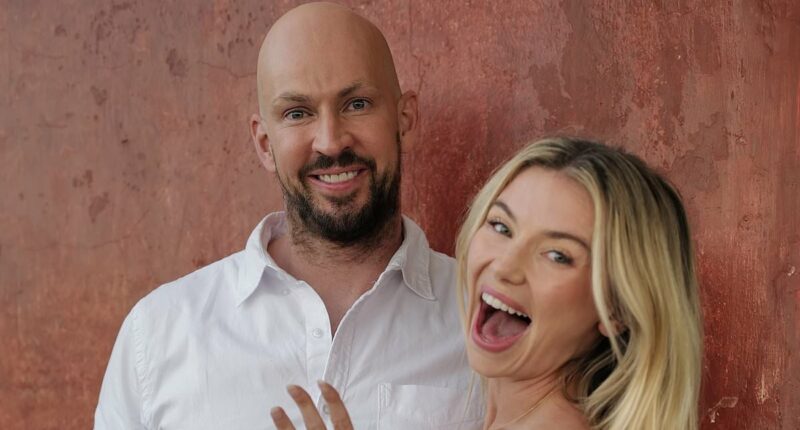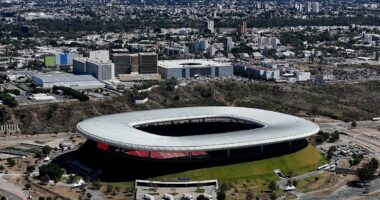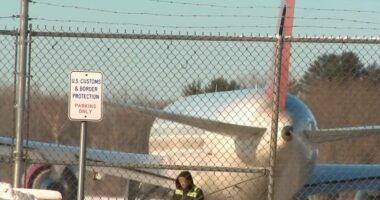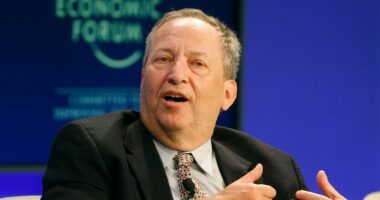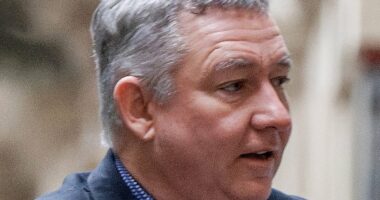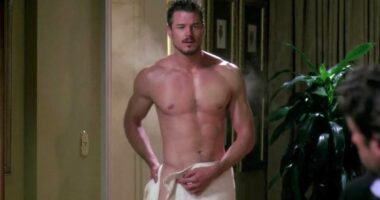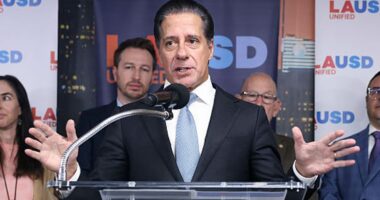Share this @internewscast.com
When the head of the BrewDog beer empire revealed his personal efforts to contribute to saving the planet in 2021, it was an announcement filled with grand terms and self-righteousness.
The brewery that James Watt began in a garage in Aberdeenshire had grown into a worldwide venture, providing employment for thousands and turning him into a multi-millionaire. He envisioned a new empire – one enveloped with trees capable of capturing carbon. Predictably, his initiative to plant hundreds of thousands of trees on a Scottish Highlands property to absorb a massive amount of carbon was to be the largest such project in the UK’s history.
The Scot called it the ‘Lost Forest’ and said its scale was so ‘staggering’ that it would be ‘bigger than 17 actual countries’.
It was meant to illuminate the path for other companies, establish new benchmarks in sustainability, and elevate the craft beer company he led beyond just carbon neutrality into the ideal state of being ‘carbon negative’.
‘We wanted to step up to the plate,’ said Watt, now 43. It was, he ventured to suggest, ‘the only way we get out of this – as humans on the planet’.
Four years on, it may be hard to imagine how the Lost Forest could have failed more spectacularly to live up to the breathless billing.
Rather than serving as an inspiring story for others, it now stands as a warning sign—and a significant embarrassment for the now ex-chief executive of the contentious brewery.
Recently, the brewer announced the sale of the project’s 9,142-acre Kinrara estate in Speyside. This sale concluded one of the most disgraceful episodes in the firm’s 18-year timeline—a taxpayer-financed environmental illusion where misinformation, arrogance, and mismanagement were all integral to the fiasco that unfolded.

James Watt, the founder of BrewDog and Made in Chelsea star Georgia Toffolo married earlier this year and together are worth £425million
Currently, there is still no sign of the forest Watt vowed, but there is much evidence of dead saplings—tens of thousands of them. Some environmental activists argue that the company has only managed to ruin a scenic gem and endanger the local wildlife.
‘BrewDog had little clue what they were doing,’ says one expert, Nick Kempe, who has watched every step of the project’s unravelling.
Watt, who stood down as BrewDog boss last year following accusations of inappropriate behaviour in the workplace, has yet to share his thoughts on the sale to rewilding outfit Oxygen Conservation.
The decision, of course, was not his. The brash business mogul, who married Made In Chelsea star Georgia Toffolo earlier this year, remains on the BrewDog board but has no involvement in its day-to-day running.
But might his silence on the matter owe more to the yawning chasm between the bleak reality on the estate in 2025 and his swaggering proclamations in 2021?
From the very beginning, the tale of the Lost Forest has been a series of embarrassing climbdowns from the bold vision set out by Britain’s seventh largest brewer four years ago.
The grand plan was for this to be the flagship scheme in BrewDog’s efforts to capture more carbon than it was emitting across its operations.
It suffered an early blow when BrewDog was forced to admit the estate it had bought for £8.8 million was almost 25 per cent smaller than the 12,000 acres originally claimed.

BrewDog founders James Watt and Martin Dickie announced their project at Kinrara Estate in 2021
Then the firm beat a hasty retreat from a marketing ploy which suggested that, for every pack of its Lost Lager beer sold, it would plant a tree in the Lost Forest.
This was an error, it accepted. But sales of the beer would help support an Eden Project scheme in Madagascar.
The claim that the Lost Forest would be ‘capable of sequestering up to 550,000 tonnes of CO2 each year’ swiftly proved to be ludicrous. In fact, the best that could be hoped for was 1 million tonnes in 100 years – if the trees lived that long. Most didn’t survive even a year.
As for the boast that the Kinrara estate venture would be the single biggest native woodland establishment and peatland restoration project in the UK, that was challenged by Jamie Williamson, owner of the neighbouring Alvie and Dalraddy Estates, who holds a PhD in forestry.
Some 9,400 acres of peatland – an area larger than the whole of Kinrara – had just been restored a few miles away. In any case, he warned – portentously, it turned out – that a third of Kinrara was quite unsuitable for tree planting.
Then, in 2023, the Advertising Standards Agency (ASA) investigated the company’s claim in an Instagram ad that it was ‘the world’s first carbon negative brewery’ and found it misleading.
It was the latest in a series of ASA rulings against BrewDog, whose then boss responded in typically combative fashion.
‘You can all sleep more soundly now, knowing that the ASA is protecting you from insufficiently extensive carbon accounting data in your Insta feed,’ said Watt in a LinkedIn post. Nevertheless, the brewer dropped its carbon negative claims. It also pledged to stop applying to buy carbon credits – the scheme by which companies ‘off-set’ their emissions has been widely denigrated as ‘greenwashing’ as it allows firms to continue to pollute the atmosphere.

When the Daily Mail visited the estate we found new saplings. Next to them lay the remains of 2023’s dead trees, many snapped or uprooted
Those embarrassments paled in comparison with the tree-planting programme itself. This was funded in large part by grants totalling more than £690,000 from the Scottish Government agency Scottish Forestry, and began in earnest in the spring of 2023.
According to figures released by Scottish Forestry following a Freedom of Information request from Nick Kempe, by September that year up to 56 per cent of the Scots pine planted – around 93,000 trees – were dead. Some 43,000 oak and other broadleaves had failed too, along with around half the birch saplings planted months earlier.
In short, BrewDog and its partners Scottish Woodlands planted 500,000 trees during 2023 and at least 50 per cent of them were dead by the following spring.
Watt admitted as much in 2024, but only after a Freedom of Information request filed by campaigner Mr Kempe revealed the scale of the failure.
Writing on his Parks Watch Scotland blog, Mr Kempe said: ‘Scottish Forestry and BrewDog decided to plant a new forest, financed with large sums of public money, with disastrous consequences for nature and carbon emissions.’
He said Scottish Forestry deserved credit for the detail they provided on the dead trees, but they were ‘powerless to change this ecologically destructive system of publicly financed greenwashing.’
On LinkedIn, where Watt regularly burnishes his entrepreneurial credentials, the then BrewDog boss blamed the saplings’ failure on the ‘fifth hottest Scottish summer on record’ and ‘savage gales and sweeping frosts’ which ‘hammered’ the Highlands.
But was that really the issue? At the neighbouring Alvie and Dalraddy Estates, owner Mr Williamson planted trees that year too. He experienced nothing like the same mortality rate.

In 2022 a BBC Disclosure programme included allegations from 12 former BrewDog USA staff that Watt behaved inappropriately and abused his power in the workplace
The mistake made at Kinrara, he says, is they brought in mechanical diggers to carry out ‘mounding’ where the soil is formed into raised beds for the saplings.
This process, he says, actually releases carbon into the atmosphere – ‘so, not very clever if you are trying to get carbon credits’.
Furthermore, the mounding left the saplings vulnerable to drought, which duly came in the summer of 2023.
The other basic error at Kinrara was planting trees at higher elevations than they could survive. On Mr Williamson’s estate, trees at a similar altitude have been growing for 150 years but at a pitiful rate, having only reached a height of 16ft. At Kinrara, he says, they attempted to plant trees on even higher ground.
When the Daily Mail visited the estate on the edge of the Cairngorms National Park this week we found new saplings, not even knee-high, growing among the heather clad hillsides. Next to them lay the remains of 2023’s dead trees, many snapped or uprooted altogether.
They are not the only casualties of the BrewDog takeover. The jobs of the estate workers were lost too, while a raft of tourism infrastructure promised in 2021 – eco lodges, a campsite, a distillery – never appeared.
Alvie estate forester Ross Bain tells the Daily Mail he thinks the rewilding drive at Kinrara is ‘a joke’.
He says a working estate with cottages on site for its employees has been hollowed out and its properties sold off. ‘The estate is essentially nothing. And they never came up. They came up for photo opportunities and now this new lot have bought it. We’ll see what they do, but it’ll be the same. You go up there and there’s no wildlife, it’s all dead and barren.’

Today, there is still no sign of the forest Watt promised. Some environmental campaigners claim the company has succeeded only in despoiling a scenic treasure
A possible explanation for the lack of wildlife is the high deer fences erected during BrewDog’s stewardship. Nick Kempe has long warned these are killers for native bird species – particularly the highly threatened capercaillie – which frequently collide with them.
Earlier this year it emerged some of this fencing – designed to keep deer out and away from the trees – had succeeded only in trapping deer inside the perimeter.
Scottish Forestry, meanwhile, has stressed the publicly funded grants received for the venture can be reclaimed if the agreed amount of woodland creation does not take place. That, however, now becomes the new owner’s problem.
All in all, then, a humbling experience for Watt in view of all that he promised. Not that the Aberdeenshire-born BrewDog founder has ever really done humble.
The entrepreneur, who together with his new bride is worth £425million, is rather better known for shameless publicity seeking.
To promote his beer, he once rode a tank through the city of London; for the same cause, his naked image was projected on to the Houses of Parliament.
He was the punk-influenced champion of what he described as ‘the world’s leading craft brewer’ – until, suddenly, his publicity was all the wrong kind.
In 2021 a group called Punks With Purpose, comprising dozens of ex-BrewDog staff, claimed the firm’s success story masked a ‘rotten culture’.
In an attack aimed at Watt, they wrote that the culture ‘deifies founders, and gives weight to sexist and misogynistic brewers who claim to be standing up for free speech’.
The following year a BBC Disclosure programme included allegations from 12 former BrewDog USA staff that Watt behaved inappropriately and abused his power in the workplace.
There were claims that female bartenders were advised on how to avoid unwelcome attention from him and that managers would try to ensure certain women were off when he visited.
On the programme, his lawyer denied all the allegations from former employees, but BrewDog went to Ofcom, claiming the BBC had treated Watt unfairly and breached his privacy rights. The regulator dismissed the complaint.
Any hopes that his departure from the top job might steady the ship look forlorn for now.
In July, BrewDog announced the closure of ten of its bars across the UK and, in August, more bad news as it emerged 1,860 British pubs had stopped stocking its beers in the past two years.
Its flagship brand, Punk IPA, has suffered a 52 per cent decline in distribution – and this on top of combined losses for the years 2022 and 2023 of almost £90million.
Publicly, at least, Watt is still smiling. He recently took to LinkedIn to share details of his wedding in the Aberdeenshire village of Gardenstown. The ring bearer was Monty, a pet spaniel; the ‘best man’ was his female cousin Ann Marie; Stanley Johnson – father of Boris and a close pal of Toffolo – compered the speeches; oh, and the invitations were sent out only three days beforehand.
Commenting on the sale of the Kinrara estate, BrewDog chief operating officer Lauren Carrol said: ‘We’re proud of all that has been achieved and of the legacy we leave, but the time is right to hand over the reins to an organisation that specialises in protecting and investing in natural capital.’
As for the buyers, an Oxygen Conservation spokesman said: ‘Our stewardship will focus on ensuring Kinrara contributes positively to people, nature and climate in the long term.
‘We fully intend to meet all regulatory and grant conditions, including those linked to woodland creation, and will continue to work closely with Scottish Forestry and other relevant partners to deliver on these commitments to a high standard.’
Meanwhile the firm’s chief executive Rich Stockdale denied BrewDog’s work at Kinrara was a complete failure.
‘We were blown away by the job that had been done,’ he said. ‘[It was] far better than we expected. No woodland creation or environmental restoration project is without its challenges.’
The challenge James Watt set himself was to save the planet by example. The feeling around these Highland glens is he could scarcely have set a worse one.
